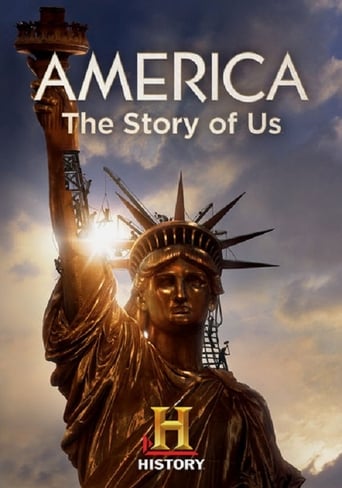lavatch
The shortcomings of this well-produced, twelve-part series lie primarily in the selection of commentators. It was not clear why celebrities were selected over scholars, but the choice came back to bite the filmmakers. Martha Stewart, Brian Williams, Tom Brokaw, and David Petraeus have all had their careers besmirched since the series was released. The main point is that they did not provide stellar insights into U.S. history. And neither did Michael Douglas or Meryl Streep!The major strength of the episodes were the dynamic use of computer graphic images. Such technological achievements as the building of the Erie Canal, skyscrapers like New York's Flatiron Building, and the construction of Hoover Dam were brilliantly recreated. The best programs were those of the early history of the nation, leading up to the Civil War. But after 1860s, the events were telescoped into superficial capsules. A glaring omission was the progressive movement in the late nineteenth and early twentieth centuries. The closing segments focused far too much on scientific and cultural history (suburbia, computer revolution, NASA) at the expense of social and political events. For viewers who enjoyed these programs, there is a beautifully written book by Kevin Brown that is a companion to the series. The twelve-chapter book dovetails closely with the episodes and offers more detailed coverage of the topics. This series is briskly paced and dynamically narrated by Liev Schreiber. While it may be slanted in the area of "feel good" propaganda, it nonetheless covers the basics of American history. One of the most interesting touches was the occasional commentary from Donald J. Trump, which was delivered at a time when he did not have presidential aspirations. One of his most interesting points was that to succeed in America takes not merely perseverance, but also brains-an assertion that is borne out in the coverage of the great entrepreneurs covered in the series.
chefjudy-414-315720
Why have commentary from actors, mayors and former mayors? Why not use actual historians even if they have conflicting views? There are no sources cited, only opinion and the constant referring to the Continental Army as a 'band of rebels' reduces the importance of the Continentals to being just blithering rabble-rousers. Paul Revere was a political extremist?... as were John Adam, Thomas Jefferson and Ben Franklin. Really? Far too much Progressive propaganda in this waste of film for my tastes, especially when the claims made by this series are so easily refuted by reputable sources that go well beyond the dubious opinions presented as fact.This series is a vast waste of time. Try John Adams (the series) or even the fantastic and epic The Patriot (Mel Gibson) as they deal with more fact than the ridiculous show reviewed here in.
bhart22
My 14-year-old son, wife, and I watched the entire series. My son, after a less-than-interesting year of American history in school, was not only interested, but excited about watching every new episode. There were a great many details about American history which are often glazed over in textbooks. I would not call this series an overview of American history, nor do I think it really attempts to become that...rather, it does a fine job of pinpointing some rather important, lesser-known events that greatly affected the direction of our country.The computer animations, at times, were poor...though I've seen blockbuster movies pushing the limits and doing little better. The side conversations and interviews with modern celebrities were interesting...at times very relevant...they were always brief, however, so even when some seemed a bit pointless, they were not really all that intrusive.If you have the chance to view this series in its entirety, and you are not an American history expert, I am certain you will learn a great deal in every episode. This series cannot be expected to be a standalone summary of American history, but it really is a great supplement to what you might already know and does a good job of actually avoiding hitting those topics which are usually taught in excruciation detail in a class setting (eg. Civil War battles).Update 1 year later: My son is completely interested in history class, and the topic of history, in general. He is not considering any career in the field, but thoroughly enjoys discussing detailed points of the topic with peers and adults. I fully attribute the spark of his interest in this topic to this mini-series.
RFM-2
I was sorely disappointed with this highly touted History Channel offering. At first, I was disturbed mainly by reenactments which were too often grossly inaccurate, but as the series began to cover eras and events that I was more familiar with, it became apparent that the narrative was also misleading. (There are too many incidents to relate, but was Lincoln REALLY "best known," prior to his presidential election, for loosing two bids for the Senate? What a misrepresentation of his political life--including two years in Congress--let alone his reputation as a public speaker.) Some "talking heads" had an aura of authority to speak on the events being covered, but too many were simply "celebrities" with apparently no expertise, and sometimes, little relevance to the current topic. One has to wonder why certain events were chosen to depict an era or turning point in the Nation's history for any reason other than their sensationalist value.This is History for those who can only tolerate short snippets and catchy graphics. Worse than being over simplified, too much is simply misleading in the way it is presented. Alas, this is pretty much what the "New" History Channel produces now. It is sensationalism over substance; entertainment over education. Such a shame...

